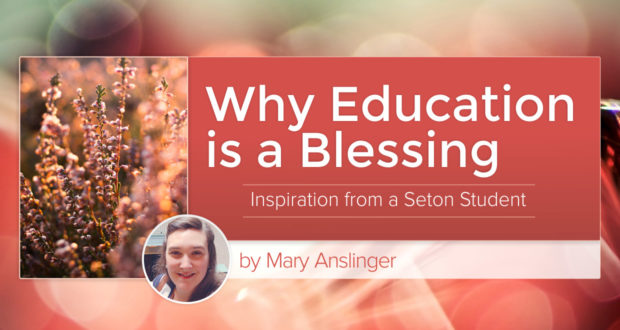by Mary Anslinger
I do feel strongly about an education. When I was younger, I never really appreciated my schooling and the work my parents invested in teaching me. To be honest, it wasn’t until my high school years that I really became inspired to further my education and to broaden my learning.
Being homeschooled, I was able to learn so much more than just the basic schooling and lessons taught from a textbook. I have learned life lessons: humility, charity, how to work and talk with people of all ages, and how to appreciate the life God gave me. Because I wasn’t subjected to the pressure of school and its society and cliques, I was able to relax and devote time to my studies and life lessons.
There were days I didn’t do school, but went out to visit the sick or dying, to pray and gain graces at Mass, to enjoy a day at the park, and I doubled up on school the next day to catch up. That was one of the perks of a home education. But, although I know my education is important, I feel that the valuable lessons I’ve learned; the personality I’ve developed; and the strong faith I’ve formed have been just as – or perhaps more – beneficial than I ever could have expected.
Inspired by Cardinal Newman
Recently, I reread a passage from Cardinal Newman’s The Idea of a University. As usual, I enjoyed his clear and candid writing style, but certain things really struck me as particularly true. Especially when he says,
“That training of the intellect, which is best for the individual himself, best enables him to discharge his duties to society.”
Newman explains that a liberal education is not necessarily about how much you learn, but, rather, about forming the person and his soul. He says that education “gives a man a clear conscious view of his own opinions and judgments, a truth in developing them, an eloquence in expressing them, and a force in urging them.”
He further claims education “teaches a person to see things as they are, to go right to the point, to disentangle a skein of thought, to detect what is sophistical, and to discard what is irrelevant.”
Newman is trying to explain how important an education is! Not only is it necessary for learning purposes, but also for the development of character, of moral discernment, and for following God’s will on earth. Newman says that, because of a liberal education, a person knows how to hold himself in the presence of others. He says some of the virtues of this education are: “being at home in society,” knowing how to influence others, knowing when to speak and when to keep silent, how to converse, how to listen, how to ask pertinent questions, and always being ready to learn something new.
I love Cardinal Newman’s points in this essay, and I highly recommend reading the entire thing for more insight.
In Teaching, You Will Learn
I once read a quote that said, “In learning you will teach, and in teaching you will learn.” How true this is. For a girl who wants to be a teacher, this quote particularly has a special place in my heart.
Although I am not yet an employed teacher, I have taught children before. Of course, children don’t realize how hard their studies will become, but at this moment they are so eager to learn and hungry for knowledge. But, as the quote says, not only do they learn, but the teacher learns, too.
And not just the studies teachers have been through before. They learn virtue. They learn patience, humility, perseverance. They learn kindness. A teacher is an important person. They take young minds and develop them into a personality – the character children will develop later in life hinges a good deal on a good and moral teacher.
An ethical teacher is vital in society, especially if the teacher is a parent and the student is their child. That’s another reason I am so eager to finish my entire education. I want to be there for my children and educate them through homeschooling, I want to help them when they have a question, or when they want to learn, and I want them to be inspired to learn, because education is a gift from God.
We should thank Him that He’s given us the mind and intellect to learn about the many blessings and mysteries He has put here on earth. “Wonder is the desire for knowledge.” (St. Thomas Aquinas)
There is always time to learn. Whether it is studies in Catholic Law, English, History, Literature, the Catechism of the Catholic Church, or even hobbies that interest you, always study.
Always learn — because God gives us this opportunity! Will you embrace it?
“The first end I propose in our daily work is to do the will of God; secondly, to do it in the manner he wills it; and thirdly, to do it because it is his will.” St Elizabeth Ann Seton
Background Header Image CC SonOfJordan | Wildflowers Image CC Patrik Bäckström;

 Seton Magazine Catholic Homeschool Articles, Advice & Resources
Seton Magazine Catholic Homeschool Articles, Advice & Resources

